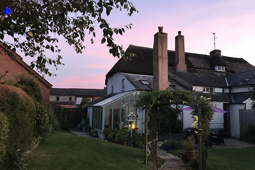
What are the common reasons for planning permission not being granted?
Project type
Planning permission will generally be granted providing the proposed work meets all of the relevant local policies and your council's Local Plan if applicable.
The more common reasons for refusal are:
- Your project would overshadow a neighbour, causing them loss of light
- Your building or structure overlooks other homes, causing loss of privacy
- The appearance would be out of character with the existing property
- Overdevelopment in the local area
- If it's considered to adversely impact on the safety of a public highway
- You have specified the use of hazardous materials
- There will be an impact upon trees or nature conservation such as bats or rare newts
- Your property is a listed building or in a conservation area
However, your application cannot be rejected on grounds of:
- The time it will take to do the work and any disruption to your neighbours while it is underway
- Your planning history - if permission was refused for a previous project, this won’t affect your current application
- The opinion of a neighbour if this is not a relevant planning policy issue - for example if they are concerned over noise or just don’t like the appearance and think the extension is too large
- Private agreements
- Anything personal like your status, background or age
Further information
How far in advance should I think about getting planning permission?






